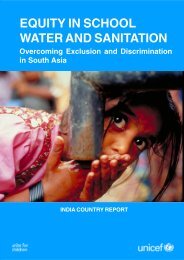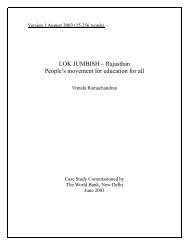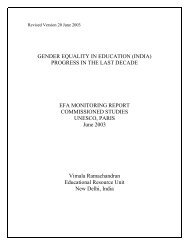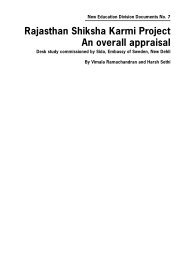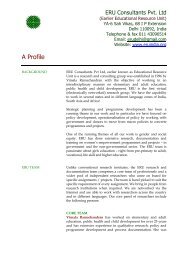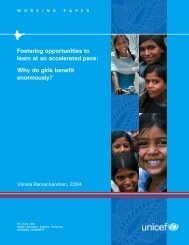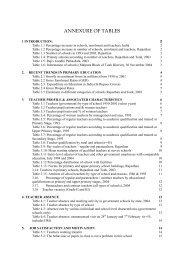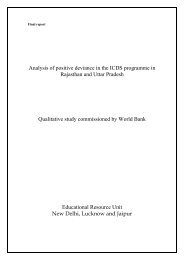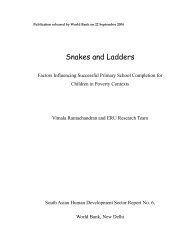primary school teachers the twists and turns of everyday practice
primary school teachers the twists and turns of everyday practice
primary school teachers the twists and turns of everyday practice
Create successful ePaper yourself
Turn your PDF publications into a flip-book with our unique Google optimized e-Paper software.
Version 20 Oct 08, edited final<br />
<strong>and</strong> it was this realisation that led to KSSP devising programmes <strong>and</strong> materials for basic<br />
literacy <strong>and</strong> science learning.<br />
Following <strong>the</strong> 1981 study, KSSP undertook several experiments. A 45-day literacy<br />
programme for children called ‘Akshara Vedhi’ was started with support from parents<br />
<strong>and</strong> <strong>teachers</strong>. The organisation also started <strong>school</strong> science clubs, first outside <strong>and</strong> <strong>the</strong>n<br />
inside <strong>school</strong>s <strong>and</strong> science fairs <strong>and</strong> quiz programmes. Its periodicals ‘Eureka’ <strong>and</strong><br />
‘Sastra Keralam’ were popular among <strong>teachers</strong>. A large number <strong>of</strong> <strong>teachers</strong> were<br />
involved in this because veteran scientists <strong>and</strong> <strong>teachers</strong> lectured to <strong>teachers</strong> in <strong>the</strong> 1970s<br />
when 1,500 <strong>school</strong> science clubs were started.<br />
In <strong>the</strong> 1970s <strong>and</strong> 1980s <strong>teachers</strong> were <strong>the</strong> main cadres <strong>of</strong> KSSP. ‘We were able to support<br />
<strong>the</strong> <strong>teachers</strong> in teaching-learning <strong>and</strong> relate this with outside society. Teachers realised<br />
that when this happens, teaching can become more interesting. This, combined with a<br />
‘h<strong>and</strong>s-on’ approach with lots <strong>of</strong> experiments, got o<strong>the</strong>r <strong>teachers</strong> as well as parents<br />
attracted to KSSP’s work. We tried to operationalise <strong>the</strong> concept <strong>of</strong> <strong>the</strong> School Complex<br />
(as suggested by <strong>the</strong> 1966 Education Commission), we built resource groups <strong>and</strong> centres<br />
at various levels within <strong>the</strong> system. Over time, KSSP experimented with textbooks by<br />
changing <strong>the</strong> sequence <strong>of</strong> <strong>the</strong> content <strong>and</strong> exploring linkages between different subjects<br />
(math <strong>and</strong> language, science <strong>and</strong> math), drawing examples from society <strong>and</strong> nature.<br />
Many resource persons emerged from this process. We were able to do a lot with<br />
ordinary textbooks’ (interview with M P Parameshwaran).<br />
In <strong>the</strong> 1990s KSSP developed alternative textbooks for Classes 1-4—this was done by a<br />
group <strong>of</strong> around 150 <strong>teachers</strong>. This was also <strong>the</strong> time when DPEP was launched in <strong>the</strong><br />
state. ‘We were apprehensive about <strong>the</strong> World Bank, but we also saw this as a big<br />
opportunity to do something. The decisive moment for KSSP came when it was decided<br />
that <strong>the</strong> state would go for curriculum <strong>and</strong> textbook renewal. SCERT was incapable <strong>of</strong><br />
doing this exercise <strong>and</strong> <strong>the</strong> DPEP State Programme Director <strong>and</strong> external experts from<br />
Ed. CIL reached out to KSSP <strong>teachers</strong> <strong>and</strong> resource persons. The LDF (Left Democratic<br />
Front) allowed us to work with <strong>the</strong> system <strong>and</strong> even “subvert <strong>the</strong> system”. Whenever<br />
<strong>the</strong> textbooks were changed, this was followed by state-wide teacher-training. Again<br />
KSSP resource <strong>teachers</strong> played a big role in <strong>the</strong>se training programmes.’<br />
The key to underst<strong>and</strong>ing Kerala is that <strong>the</strong> change started from below, beyond <strong>school</strong><br />
hours, on weekends <strong>and</strong> on holidays. What is interesting is that even <strong>the</strong> private <strong>school</strong><br />
<strong>teachers</strong>’ association (which is affiliated to <strong>the</strong> Congress party) worked with KSSP<br />
during <strong>the</strong> 1980s <strong>and</strong> 1990s. Change cannot come about by writing a few policy<br />
documents—it is people on <strong>the</strong> ground <strong>and</strong> in key positions <strong>and</strong><br />
organisations/institutions with vision who can make a difference on <strong>the</strong> ground.<br />
(Source: Interviews with M P Parameshwaran <strong>and</strong> Trissur, A. A. Bose (teacher), K.K.<br />
Krishna Kumar, C. P. Narayanan (Member State Planning Board) <strong>and</strong> Krishnan Master<br />
(a teacher <strong>and</strong> ma<strong>the</strong>matician in Thiruvananthapuram) between 17 <strong>and</strong> 20 May 2008).<br />
Turning <strong>the</strong> system upside down in Tamil Nadu<br />
In Tamil Nadu, <strong>teachers</strong> retraced with us <strong>the</strong> journey from <strong>the</strong> ‘joyful’ learning<br />
package <strong>of</strong> <strong>the</strong> DPEP days to <strong>the</strong> ABL package <strong>of</strong> today. The overall environment in<br />
teacher-training programmes seems a distant cry from what we saw just a few years<br />
ago:<br />
1988-89: P-MOST—Programme for Massive Orientation <strong>of</strong> School Teachers<br />
based on <strong>the</strong> NCERT module.<br />
1993-94: SOPT—Special Orientation Programme for Teachers, also based on<br />
<strong>the</strong> NCERT module.<br />
54



